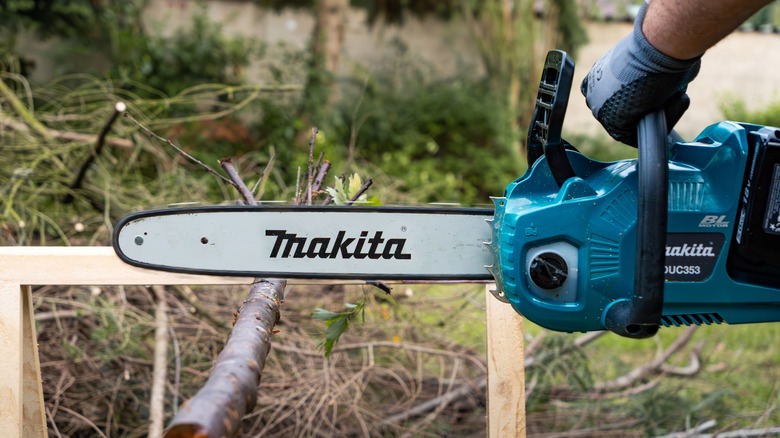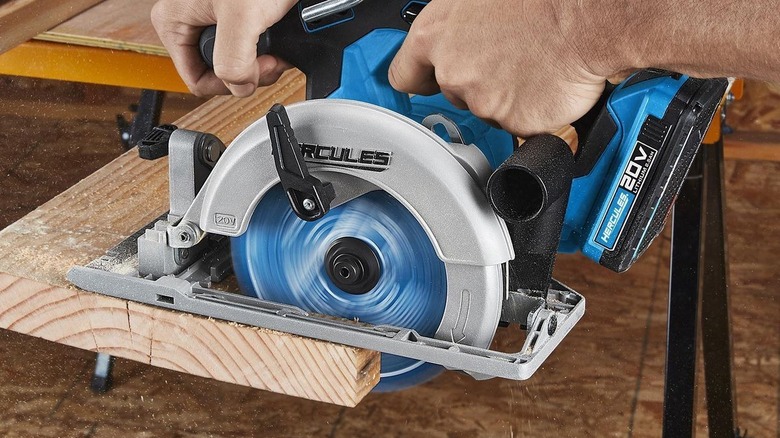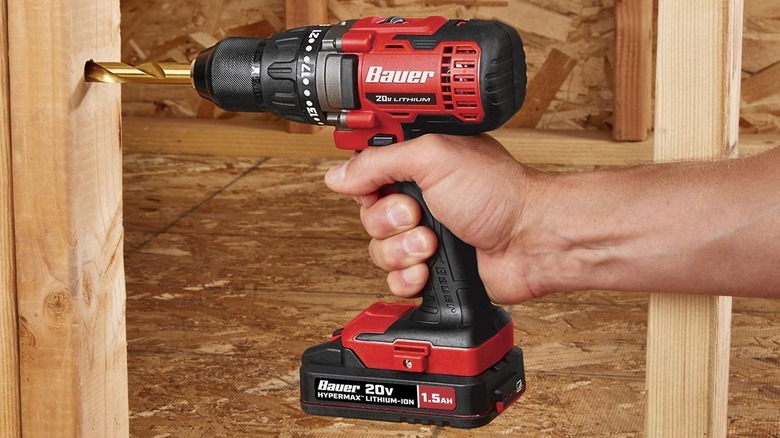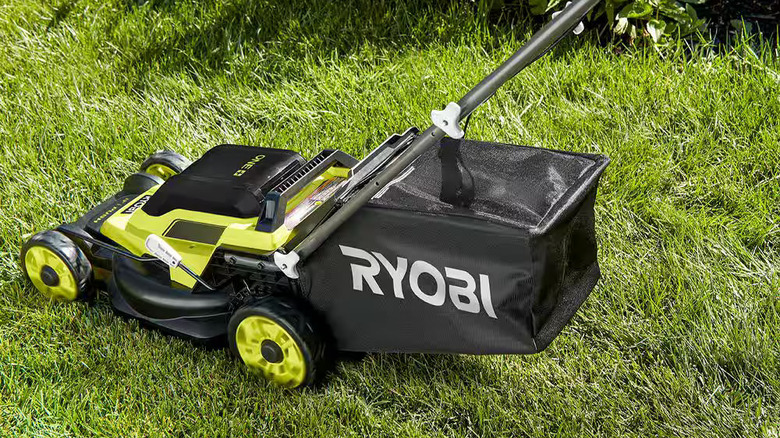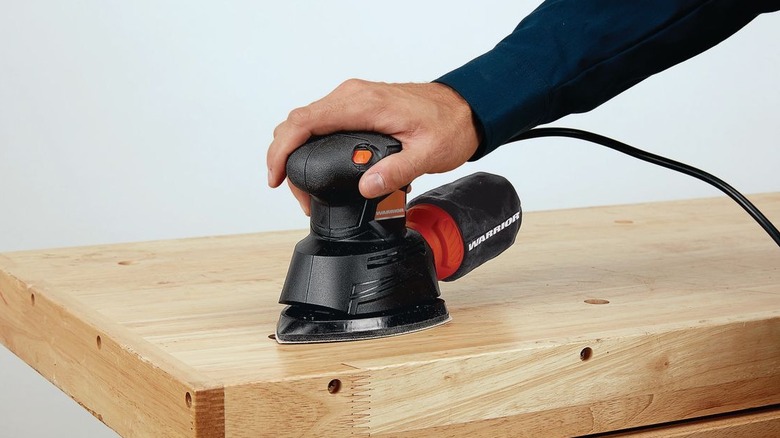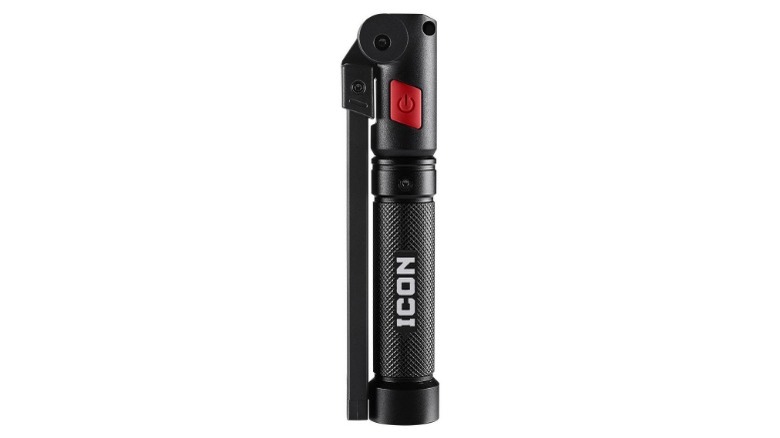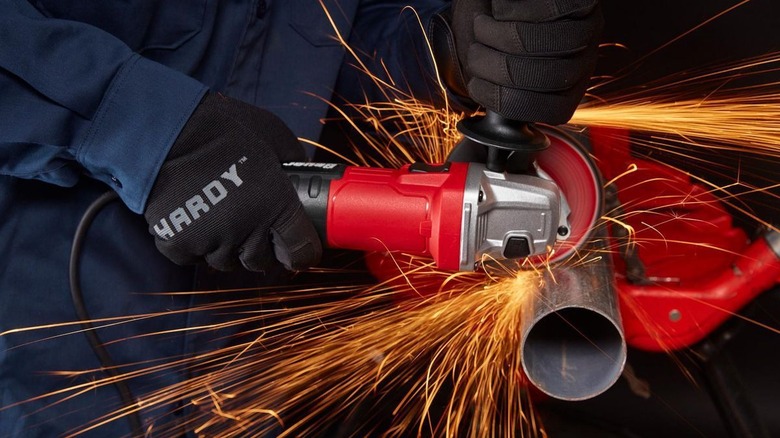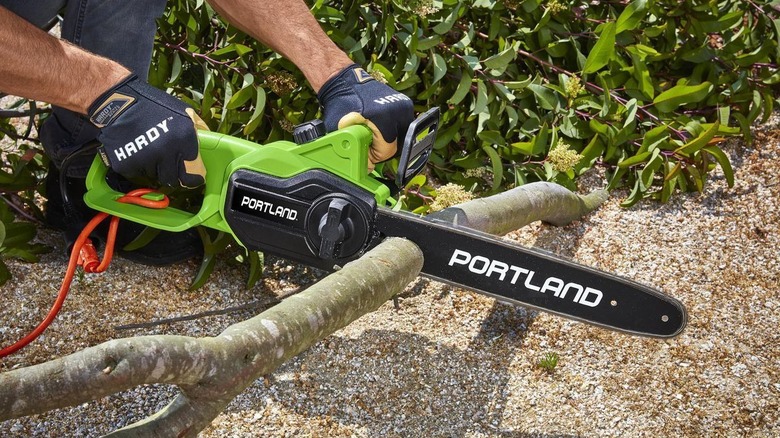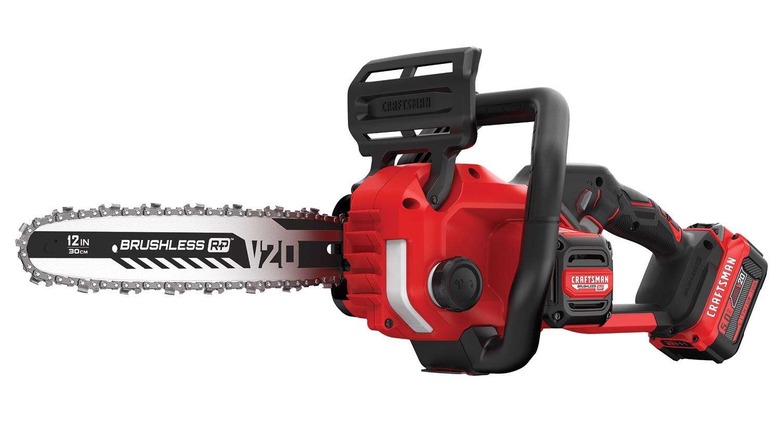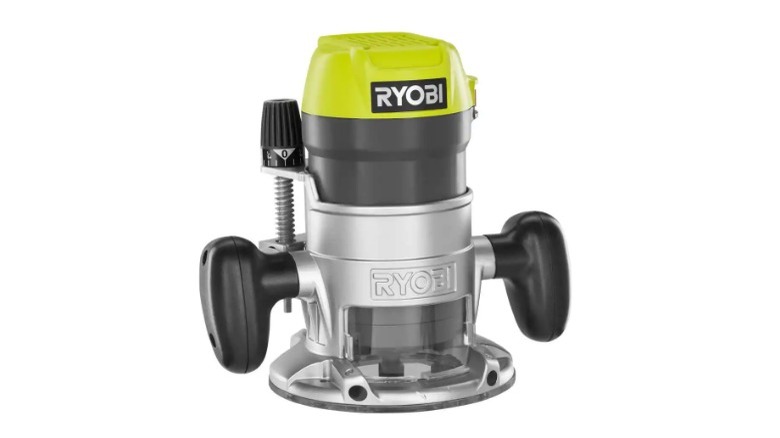The 10 Best Budget-Friendly Alternatives To Makita Tools
Makita is one of the most respected tool brands on the market, offering a consistent mix of performance, durability, and convenience across its sprawling range. The brand is constantly updating its lineup with new products, some of which are upgrades of its older tools and some of which are entirely fresh offerings. This means that there's always something new for Makita fans to buy, but blindly buying a tool based on Makita's overall reputation isn't always a good move.
This is especially true for home DIY and landscaping enthusiasts, who might end up paying a steep premium for a tool that's either more capable than they need or, in some cases, no more capable than an equivalent tool from a cheaper brand. SlashGear put together this list of cheaper alternatives to Makita tools to help DIYers avoid breaking the bank. For reference, we have compared a tool from each of these brands to an equivalent Makita product.
Hercules for saws
Harbor Freight offers a number of cut-price alternatives to Makita products for buyers looking to save money, with Hercules being one of the discount outlet's many in-house brands. Its lineup of cordless saws spans a similarly broad range to Makita, with circular saws, reciprocating saws, band saws, and more on offer. However, Hercules-branded saws are consistently cheaper.
To take an example, the Hercules 20V Cordless 6-1/2 inch Circular Saw retails for $79.99 at Harbor Freight. It sports several ease of use features including a built-in LED light that illuminates the cut line and an integrated rafter hook for easy storage. It's powerful, too, reaching a maximum speed of 5,000 rpm. In contrast, a Makita-branded equivalent saw costs almost double the price, retailing for $149. It's a pound heavier than the Hercules saw and can reach a lower peak rpm of 3,700 rpm. The price of both of these tools does not include a battery and charger, with each tool requiring its respective brand's proprietary battery to function.
Black + Decker for hedge trimmers
Makita's range of hedge trimmers packs professional grade power, with its top-spec cordless electric trimmer being the most powerful tool of its kind on the market. That's great news if you're looking to tackle the most demanding hedges and shrubbery, but for the average home user, there's a risk that you end up paying for power you don't need. Black + Decker's hedge trimmer range is a budget-friendly alternative, with prices across its lineup consistently lower than Makita, but with enough power for most home users.
Black + Decker offers both corded and cordless electric hedge trimmers, while Makita's current range is all cordless. The latter brand's 22-inch cordless hedge trimmer retails as a standalone tool for $189, and can reach a maximum of 1,350 strokes per minute. It can cut through branches up to 3/5 inch thick. In comparison, the Black + Decker 20V MAX 22-inch Cordless Hedge Trimmer retails in tool-only form for $69.98, less than half the price of its Makita-branded equivalent. It's slightly more capable, being able to reach a maximum of 2,400 strokes per minute and cut branches up to 3/4 inch thick.
Bauer for cordless drills
Makita's drills are a favorite among professionals and seasoned home users, and for good reason — they score highly compared to other major drill brands in both performance and user satisfaction. However, their premium prices mean that many users might well get better value for money from a cheaper alternative like Bauer. One of Harbor Freight's in-house brands, Bauer offers a wide range of power tools, with its cordless drills available for a fraction of the price of an equivalent Makita drill.
Bauer's most popular cordless drill is its 20V Cordless 1/2 in. Drill/Driver Kit, which retails for $54.99 and includes both the tool and a battery and charger. Makita's closest equivalent drill kit retails for $169 and offers similar specs to the Bauer. The Makita generates up to 440 inch pounds of torque, while the Bauer generates 450 inch pounds of torque. Maximum speeds for the two tools are also similar, with the Makita reaching 1,900 rpm and the Bauer reaching 1,700 rpm.
As well as being backed up by thousands of positive reviews on Harbor Freight's website, Bauer drills have also been put through their paces by independent testers like Consumer Reports and fared well. Makita's products still had the edge overall in the outlet's testing, but given the gulf in price, many buyers might find the Bauer better value.
Ryobi for lawn mowers
Both Makita and Ryobi offer a wide range of mowers to suit all kinds of lawns, but Ryobi's are consistently cheaper. Both brands also have the advantage of a sprawling range of tools that utilize their respective cordless battery systems, with Ryobi's best home landscaping tools going under the microscope in a previous SlashGear roundup.
Makita's most affordable lawn mower kit includes a 13-inch push mower plus a battery and charger, and retails for $399. In contrast, the Ryobi One+ 18V 13 inch Cordless Push Lawn Mower with a battery and charger costs just $249. Both offer similar runtime, with Makita claiming its mower is suitable for yards up to 1/5 acre in size while Ryobi claims its mower is good for up to 1/4 acre. Both come with a 2-in-1 bagging and mulching function and a variable cutting height, and both come with a 4Ah battery. In fact, there's very little difference at all between the two mowers in terms of specification, despite the Makita being significantly pricier.
Warrior
Warrior's budget-oriented tools aren't going to be a worthy replacement for frequently used Makita tools, but for occasional use, they're worth considering. It can be easy for fans of a major tool brand — in this case, Makita — to head straight for that brand's tool range no matter how often they're planning to use the tool. However, buyers looking for a tool for a single project can end up overpaying for something they'll very rarely use.
Exclusive to Harbor Freight, Warrior's range of tools covers everything from table saws to detail sanders, offering less capability but at the cheapest possible price. For example, the Warrior 1.1 Amp Corner/Detail Sander retails for only $19.99, making it a great option for DIY enthusiasts looking for a cheap corded tool for occasional use. A similar Makita corded sander retails for around four times the price, at $79. The Makita has the edge on performance, reaching a maximum of 14,000 orbits per minute compared to the Warrior tool's 12,500 orbits per minute. However, for value for money, the Warrior is the clear winner for occasional users.
Icon for work lights
Every tool brand has a few weak spots in its range where buyers pay more for the brand name than for any additional capability. In Makita's range, its CXT battery powered LED flashlight is one such weak spot, with its $79.99 retail price and 190 lumen beam. Lesser-known brands like Harbor Freight's Icon brand offer much better value for money, with its 800 Lumen LED Rechargeable Magnetic Handheld Foldable Slim Bar Work Light being the most direct competitor to the aforementioned Makita flashlight.
The Icon work light retails for $39.99 and offers over four times the brightness of the Makita light, plus since it's magnetic, it can be attached to metal surfaces as well as held in hand. It's tough too, being IP54 rated against dust and water ingress. Perhaps the most egregious issue with Makita's flashlight is the fact that it doesn't come with a built-in battery and instead requires a separate Makita 12V CXT battery to run. The Icon work light, in comparison, includes a built-in, rechargeable battery all while costing half the price.
Bauer for angle grinders
Makita angle grinders are well-regarded among professionals, but at their premium price point, they're not necessarily the best value for less frequent home users. Harbor Freight brand Bauer offers a range of both corded and cordless angle grinders, with the cheapest in that range being the 7 Amp 4-1/2 inch Slide Switch Angle Grinder. It retails for $29.99, while an equivalent Makita corded angle grinder costs $84.
Both the Makita and the Bauer angle grinder can reach a maximum of 11,000 rpm, and both feature a slide switch with a lock-on function. Since both feature eight foot long power cords, there's no difference in portability between the two either. A grind wheel is included with the Makita and is not included with the Bauer, but one can be picked up separately from Harbor Freight for a few bucks. While some buyers might worry about the cheaper tool's long term quality and durability, it's backed up by more than 1,400 customer reviews on Harbor Freight's website with a very high average rating of 4.7 out of 5 stars.
Portland
Portland's range of outdoor tools covers all the basics, from chainsaws and hedge trimmers to leaf blowers. Its tools are aimed at buyers looking for cheap, straightforward tools for infrequent use, and unlike many other Harbor Freight brands, it does not offer a cordless tool range. Portland's tools are not necessarily as capable as their Makita-branded equivalents, but then, it can be easy to overpay for more capability than you realistically need, especially for the most brand-loyal consumers.
For example, Makita's 14-inch corded chainsaw offers superior power, with a 14.5 amp motor, but the Portland 9 Amp 14-inch Electric Chainsaw is no slouch. It will swiftly deal with most home landscaping jobs for a fraction of the price of the same sized Makita chainsaw, retailing for $44.99 compared to Makita's $269. Portland's other tools are similarly cut-price, and for buyers on a tighter budget, they're so cheap that sacrificing a limited amount of capability may be well worth the savings.
Craftsman for chainsaws
While buying a Portland corded chainsaw — or indeed any of the brand's tools — will require some degree of compromise, Craftsman chainsaws don't require such sacrifices. In SlashGear's comparison of the best chainsaw brands, Craftsman ranked a respectable eighth place, with our summary singling out the brand's value for money as a particular selling point. The brand's range of gas, corded electric, and battery powered chainsaws also offer buyers more choice than Makita, as Makita no longer sells gas powered chainsaws.
For a fair comparison, we're sticking to comparing the two brands' cordless electric 12-inch chainsaws here. The Makita 12-inch chainsaw is available as a kit including the tool, a 4Ah battery, and a charger for $369. Craftsman's equivalent offering is the V20 Brushless RP 12-inch 20V Battery Chainsaw Kit, which retails for $219 and features the tool, a 5Ah battery, and a charger. Both are covered by a three-year warranty and both feature interchangeable batteries that can be used with each brand's wider range of cordless tools.
Ryobi for wood routers
With plenty of fans in its own right, Ryobi is most famous for its cordless power tools and interchangeable battery system. However, it also offers a range of corded power tools, often selling tools in both corded and cordless form. Makita does the same, although usually charges a premium compared to Ryobi. This price premium can clearly be seen when comparing the brand's routers, with Ryobi's tools costing less than Makita's, whether they're battery or mains powered.
In some cases, Ryobi offers superior power as well as a lower price. Makita's 6.5 amp corded router retails for $149 and makes 1.25 peak horsepower, while the $99 Ryobi 8.5 Amp Fixed Base Corded Router generates 1.5 peak horsepower. The Makita router offers a slightly faster cutting speed, boasting a maximum of 30,000 rpm compared to the Ryobi router's 25,000 rpm, but whether that speed difference is worth an extra $50 is another question. For buyers looking for the best value for money, the answer is that it's probably not.
